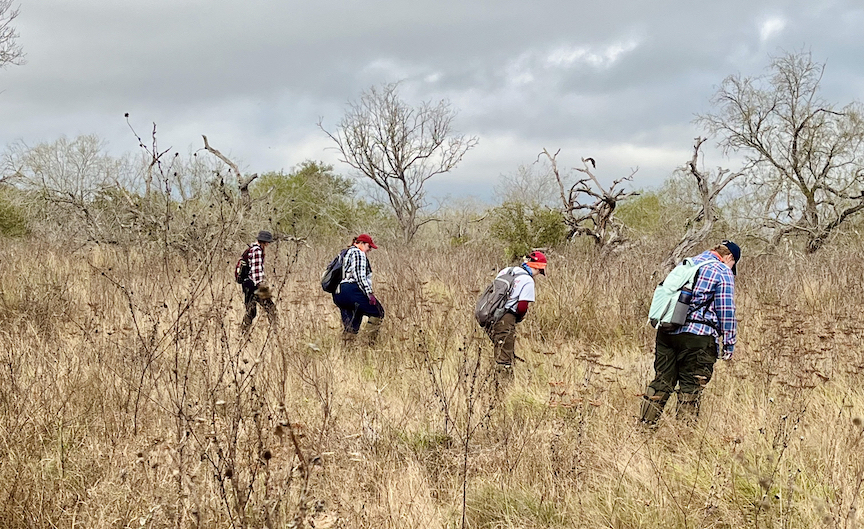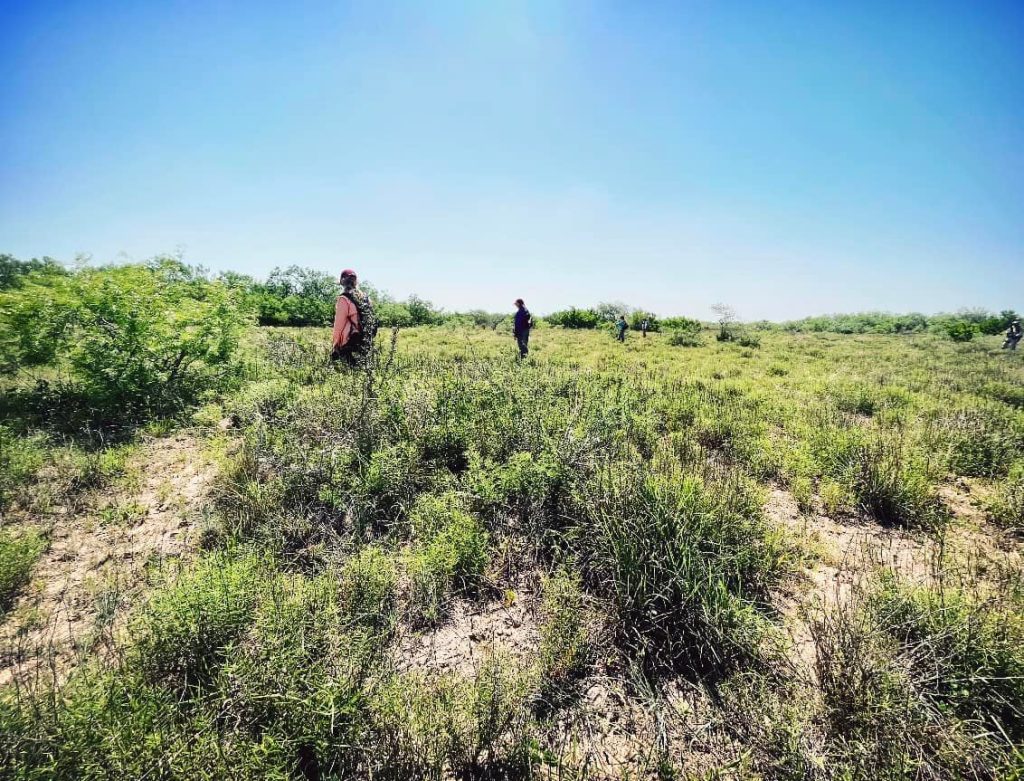I woke up this morning with a lot of anticipation for the day, so much so that I kept waking up before my alarm had gone off, hours before even. Every time I checked my phone, and it wasn’t 6 am, I felt an odd sense of disappointment. I think there was a level of anticipation there, but also a level of needing to get out there. To just rip the bandage off and start the day so that I could feel a little less anxious. Even though we woke up early, we were running behind as we grabbed all of our things to head out for breakfast and into the brush. For some of us, this wasn’t the first time, but for others it was, and yet I think we all shared a similar sense of anxiety and anticipation for the day.
We headed out to meet up with Don and Ray at the ranch they were staying at. We loaded into their four wheel trucks and headed south to the ranch where we would be searching for active migrant pathways. In one section, there is a large power line that runs north-south along the property, and we stopped there to begin setting up to conduct our line searches along the power line. We worked in half a mile segments in each direction, walking along the clearing as well as looking into the brush for areas where migrants may have stopped to eat, rest, or drop off items they were no longer able to carry.

Besides Amanda and Peyton being new for the year, we were also joined by Reed and Melissa (and Melissa’s horse, Danny) to help in the search. I think the added people really made this feel a bit more manageable, as Melissa went ahead on her horse to search the area while Reed assisted in our line searches and delved into the brush whenever we spotted something that may be an artifact or skeletal in nature.


Every time I am out in the brush, I am reminded of just how vast the ranches are. I grew up thinking that owning 14 acres was a lot of land, but in Brooks County, ranches can span thousands, or even hundreds of thousands of acres. The ranch we were on today was huge, and standing in the middle of it made the scale feel almost unreal, with the brush and horizon seeming to extend endlessly in every direction. Even within the small area we covered, it was easy to get turned around when the power line wasn’t visible. When you couple that with the fact that many of the migrants are traveling in the dark, already exhausted, and moving quickly, it becomes easy to understand how someone could lose their sense of direction.
The temperature was another factor to contend with, with highs in the upper 80s to low 90s and feeling even warmer under clear skies and direct sun. We downed our water quickly, especially compared to last year. As we headed back to the truck, drenched in sweat, Don talked about how high temperatures in Texas often influence when migrants travel through the area. He explained that they typically avoid traveling during the day due to the heat and the open visibility, though he noted that he had once encountered a group that had been traveling during the day.
He explained that the group was exhausted and that their water had become warm and contaminated, rendering it essentially undrinkable. I thought about my own water, how I had chosen not to take a sip during one of our recent water breaks because it was too warm, opting instead to wait for the cooler water I had left in Ray’s truck. In that moment, I think I fully recognized that migrants often do not have access to a steady supply of clean water during their journey, relying only on what they can carry with them or what they happen to find along the way… typically small ponds or watering holes intended for livestock or wildlife, not for human use.

After we left, dirty and exhausted, we took a small tour of the ranch that Don, Ray, Reed, and Melissa are staying at, which provided a welcome opportunity to slow down and relax after the day’s work. We then went to Strickland’s, a local restaurant in the area with some of the best food I have ever had, to unwind and catch up after the long day. Being able to talk with everyone in such a casual setting felt like a moment of calm amidst the chaos of it all.
I was especially struck by how grateful I felt to be there, to be a part of this team and to contribute, in whatever small way I can, to the work that Don, Ray, and Dr. Latham have devoted so much time and effort to over the years.
As I write this, I’m tired, dirty, and yet reflective and grateful for the people, the purpose, and the opportunity to be here, with that same sense of anticipation from this morning returning as we prepare for tomorrow.






